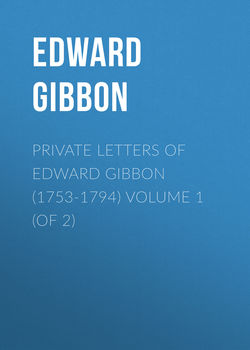Читать книгу Private Letters of Edward Gibbon (1753-1794) Volume 1 (of 2) - Эдвард Гиббон, Edward Gibbon - Страница 16
13.
To his Father
ОглавлениеNew Bond St., December the 14th, 1758.
Dear Sir,
I must begin by the most disagreeable news I have to tell you. All our tickets have come up blanks.[16] All our visionary plans of grandeur are disappointed, the dream of those who have had the ten thousand pounds will last a little, but perhaps, not much longer.
I am settled at last in a very good lodging; I say at last because I lived a day and a half at Mrs. Porten's in the middle of hurry and noise and meazels. My aunt desires her compliments to you and Mrs. Gibbon. We eat the levret together. Pray did you not send her a hare some time ago? I know not what happened, but she never received it. I saw at her house Dr. Maty's son,[17] a little odd cur, and by an unexampled generosity I tipped the boy with a crown and the father with a coal of fire. Last night I was at the King's Scholars play, and, proper allowances being made, was very well entertained. All spoke justly enough and some (one or two) promised a good deal. Harry Courtenay was one of these, but he disappointed me before the end of the play. He came on with ease and entered well into his character (an old man in the Phormio), got safe over the dreadful first scene. From thence he sunk gradually tho' encouraged by repeated claps, dragged himself through the last scenes in the most dead and lifeless manner. My expectations were deceived more than they ever were in my whole life. I am just come from Madame Cilesia's.[18] She received me in a dirty white linnen gown, no rufles; in a word, a negligé qui n'alloit pas le mieux du monde, à sa Majesté Corse. She received me, however, like an old fellow-sufferer. Not that we talked at all of the M…s, tho' on the brink of it several times, but neither of us broke the ice. I do not think her pretty, something sweet enough in her face, mais enfin voilà tout. I am to dine there to-morrow. To-day I dine in state at home, and after dinner shall go to Cleone,[19] though generally disliked.
I lodge in New Bond Street at a linnen draper's, a Mr. Steward, and I have a very good first floor, dining-room, bed-chamber and light closet with many conveniences for a guinea and half a week. I believe I shall keep to it. Lee is very serviceable to me, he has got me a very handsome chair for twenty-seven shillings.
I beg you would present my best compliments and true respects to Mrs. Gibbon.
I am, Dear Sir,
With the greatest regard,
Your most faithful, humble servant and son,
E. Gibbon, Junior.
P.S. – I have not yet been able to do your commissions.
Footnote_16_16
The lottery began to be drawn November 14, 1758; the last ticket was drawn December 12, when "No. 72,570 in the present lottery was drawn a prize of £10,000."
Footnote_17_17
Matthew Maty, born near Utrecht in 1718, settled in England as a physician in 1741; in 1756 he was appointed an under-librarian at the British Museum, and in 1772 succeeded Gowin Knight as chief librarian. His Journal Britannique (1750-55), published in French at the Hague, contains a bi-monthly review of English literature. He died in 1776. If the son, whom Gibbon "tipped," resembled the father, this passage may confirm Dr. Johnson's description of Maty as a "little black dog." For Gibbon's relations with Maty, see note to Letter 15.
Footnote_18_18
Dorothea Mallet, Madame Celesia (1738-1790), a poet and dramatist, eldest daughter, by his first wife, of David Mallet. She married Pietro Paolo Celesia, a Genoese gentleman, who was ambassador to this country from 1755 to 1759, and was afterwards ambassador to Spain. Madame Celesia's drama of Almida, an adaptation of Voltaire's Tancrède, was brought out at Drury Lane in 1771, and published in the same year.
Footnote_19_19
Dodsley's tragedy of Cleone was then being played at Covent Garden.
